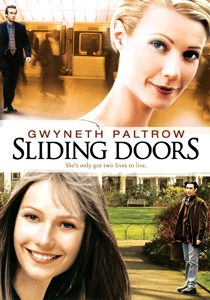Among writers who have only penned one well-known movie, Peter Howitt has one of the most impressive turns at the plate. Also serving as director, his “Sliding Doors” (1998) is a super easy-to-like multiverse love story that slides between happiness and sadness as comfortably as rising star Gwyneth Paltrow’s facial expressions.
Today, this British romance film plays like a smile-worthy slice of a relaxed 1998, with a “Dawson’s Creek”-reminiscent soundtrack featuring dashes of Abra Moore, Aimee Mann and Dido, along with classic rock artists to indicate its timeless quality.
Howitt makes the multiverse concept easy to follow over 100 minutes. A simple yet smart rewinding visual shows us Helen (Paltrow) catches her London subway train in one reality, and barely misses it in the other reality. As we cut back and forth between the two universes, it’s never confusing, partly because of visual cues (Helen’s different hairstyles), partly because of her emotional state.

“Sliding Doors” (1998)
Director: Peter Howitt
Writer: Peter Howitt
Stars: Gwyneth Paltrow, John Hannah, John Lynch
In one universe, she catches her husband Gerry (John Lynch) cheating, and in the other she barely misses catching him. While the story may be simple, Howitt has a lot to say about how, yes, the butterfly effect does change things, but perhaps the universe ultimately snaps back into its proper state. That view won’t hold much water for people who have experienced extreme tragedies, but “Sliding Doors’ ” conclusion has a nice way of addressing that issue, too.
The metaphysics of love triangles
Outside of the metaphysics, the film expertly plays the love triangle notes. We of course adore Helen whether she is miserable (and working two blue-collar jobs to keep her finances afloat with novelist Gerry) or happy (starting her own PR firm with a nudge from new potential beau James, played by the Scottish-brogue-sporting John Hannah).
Lynch’s Gerry behaves badly, but he’s an amusing joke, and frankly the character whose scenes I most enjoy. Even his best pub pal (Douglas McFerran’s Russell) sees Gerry’s self-inflicted love-triangle blues (with Jeanne Tripplehorn’s Lydia – Cruella Deville’s meaner sister, as one character describes her) as a source of laughs, because it’s such a cliché.
James, meanwhile, is a charmer with his quick wit, but Hannah projects genuineness. Keeping us (and Helen) on our toes, James is harboring a secret that’s on the predictable side. But as far as rom-com misunderstandings go, Howitt at least moves past this one pretty quickly. It’s refreshing that none of the three leads have to be dumbed down to accommodate a shallow plot.
Although “Sliding Doors” is fantastical, it hits more real emotional beats – and has a more real message about how living a lie is never the right move – than your average rom-com. It has slid safely onto the list of elite sci-fi rom-coms.


